Brexit Brief Newsletter
October 2019

The October issue of the Brexit Brief includes an update on another month of intense government and parliamentary activity. In the update we include: developments leading up to and agreement of a revised Withdrawal Agreement and Ireland and Northern Ireland Protocol; information on the first Saturday sitting of the House of Commons since 1939; the letters the UK sent to the EU; the ‘Flextension’ agreed by the EU; and response to the Withdrawal Agreement Bill from the Scottish and Welsh governments.
PROPOSALS FOR A NEW AGREEMENT WITH THE EUROPEAN UNION

On the 3 October, the Prime Minister made a statement in the House of Commons on Brexit negotiations and the government’s proposals for a new agreement with the European Union. Addressing the proposal for a replacement to the ‘backstop’, the Prime Minister said:
“Under the proposals in this new protocol, Northern Ireland will be fully part of the UK customs territory, not the EU customs union, but there will be no need for checks or any infrastructure at or near the border between Ireland and Northern Ireland. Indeed, I have already given a guarantee that the UK Government will never conduct checks at the border, and we believe that the EU should do the same, so there is absolute clarity on that point.
Instead, under this new protocol, all customs checks between Northern Ireland and Ireland would take place either electronically or, in the small number of cases where physical checks would be necessary, at traders’ premises or other points in the supply chain. We have put forward a method for achieving this based on improving and simplifying existing rules, trusting certain traders and strengthening our co-operation with Ireland, in a spirit of friendship and sensitivity to the particular circumstances.
While these proposals will mean changes from the situation that prevails today in Ireland and Northern Ireland, it is their driving purpose to minimise any disruption. To support the transition further, we propose a new deal for Northern Ireland that will boost economic growth and competitiveness and set in train new infra- structure, particularly with a cross-border focus.”
PROROGATION OF PARLIAMENT
On 8 October, at the Privy Council held by the Queen at Buckingham Palace, the order proroguing Parliament from that date to Monday 14 October 2019 was approved. Prorogation brought to an end nearly all parliamentary business and none of the five Brexit Bills which had been introduced in Parliament were carried over to the next session.
This prorogation of Parliament followed the Supreme Court’s decision that the prorogation that had occurred in September was unlawful. Regarding that prorogation, the Supreme Court judgment stated that:
“It is impossible for us to conclude, on the evidence which has been put before us, that there was any reason - let alone a good reason - to advise Her Majesty to prorogue Parliament for five weeks, from 9th or 12th September until 14th October. We cannot speculate, in the absence of further evidence, upon what such reasons might have been. It follows that the decision was unlawful.”
MEETING BETWEEN AN TAOISEACH AND THE PRIME MINISTER
On 10 October, following a meeting between Boris Johnston and Leo Varadkar, the Irish Government Press Office issued the following statement.
|
The Taoiseach and Prime Minister have had a detailed and constructive discussion. Both continue to believe a deal is in everybody’s interest. They agreed that they could see a pathway to a possible deal. Their discussions concentrated on the challenges of customs and consent. They also discussed the potential to strengthen bilateral relations, including on Northern Ireland. They agreed to reflect further on their discussions and that officials would continue to engage intensively on them. Following their discussions, The Taoiseach will consult with the EU Task Force and the UK Brexit Secretary will meet Michel Barnier tomorrow morning. |
THE STATE OPENING OF PARLIAMENT

On 14 October, the State Opening of Parliament took place and Parliament resumed its activities. The Queen’s Speech opened with a reference to the United Kingdom’s departure from the European Union.
“My Government's priority has always been to secure the United Kingdom's departure from the European Union on 31 October. My Government intends to work towards a new partnership with the European Union based on free trade and friendly cooperation.
My Ministers will work to implement new regimes for fisheries, agriculture and trade, seizing the opportunities that arise from leaving the European Union. An immigration bill, ending free movement, will lay the foundation for a fair, modern and global immigration system. My Government remains committed to ensuring that resident European citizens, who have built their lives in, and contributed so much to, the United Kingdom have the right to remain. The bill will include measures that reinforce this commitment. Steps will be taken to provide certainty, stability and new opportunities for the financial services and legal sectors.”
Contained within the Queen’s Speech were proposals to reintroduce, and bring forward additional, Brexit bills. The Institute for Government commentary on the Brexit bills included the following observations.
Agriculture Bill: this bill was introduced in the last parliamentary session and it looks likely to be reintroduced unchanged.
Environment Bill: part of this bill was published in the last parliamentary session. It appears it will be unaltered with the exception of new legal targets for environmental improvement.
Extradition (Provisional Arrest) Bill: After the UK leaves the EU, the UK will no longer have full access to the European Arrest Warrant (EAW) which allows police officers to arrest individuals wanted by authorities in the other 27 EU member states. This bill intends to address this capability gap by allowing police officers to arrest individuals subject to an Interpol (the international policing organisation) red notice issued by a ‘trusted’ country – an arrangement which EU27 authorities will have to use in place of EAWs to apprehend individuals they believe to be in the UK.
Financial Services (Implementation of Legislation) Bill: While there was a Financial Services (Implementation of Legislation) Bill introduced in the last parliamentary session, this bill appears to have additional provisions. The bill’s stated aim is to streamline financial investment into the UK, give Gibraltar access to the UK financial market and implement the Basel financial standards – a set of rules that require banks to hold certain levels of capital and liquid assets.
Fisheries Bill: this bill was also tabled in the last parliamentary session. It has been announced in the Queen’s Speech with no clear alterations.
Immigration and Social Security Coordination (EU Withdrawal) Bill: this bill failed to receive Royal Assent in the last parliamentary session and appears to have returned with only minor changes. Its purpose is to repeal freedom of movement for EU and EEA nationals; clarify the rights of Irish citizens post-freedom of movement; and give power to amend EU social security co-ordination legislation.
Private International Law (Implementation of Agreements) Bill: this bill will implement three key international conventions into UK domestic law: the 1996, 2005 and 2007 Hague Conventions, which the UK has been party to by virtue of its EU membership. It will also give the government power to implement further international legal agreements in UK law.
Trade Bill: this bill was introduced but did not receive Royal Assent in the last Parliament. It appears to be unchanged.
Withdrawal Agreement Bill: this is the key Brexit bill to facilitate leaving the EU with a deal – the government cannot ratify the Withdrawal Agreement until it is passed. It will implement the Withdrawal Agreement in domestic law, including providing for the transition period; protect the rights of EU, EEA and EFTA citizens in the UK; establishing the Independent Monitoring Authority to protect citizens’ rights and set out the process for the commencement of the Northern Ireland Protocol.
Debate on the Queen’s Speech concluded on 24 October when the relevant motion was passed (For: 310 and Against: 294).
REVISED WITHDRAWAL AGREEMENT AND POLITICAL DECLARATION AGREED AT EUROPEAN COUNCIL
On 17 October Boris Johnston tweeted that the UK had agreed a new deal with the EU. The European Commission did the same and published the ‘Revised Political Declaration’ setting out the framework for the future relationship between the EU and the UK and the ‘Revised Protocol on Ireland and Northern Ireland included in the Withdrawal Agreement’. A letter from the Commission President, Jean-Claude Juncker to President Tusk recommended that the EU Council endorse the deal.
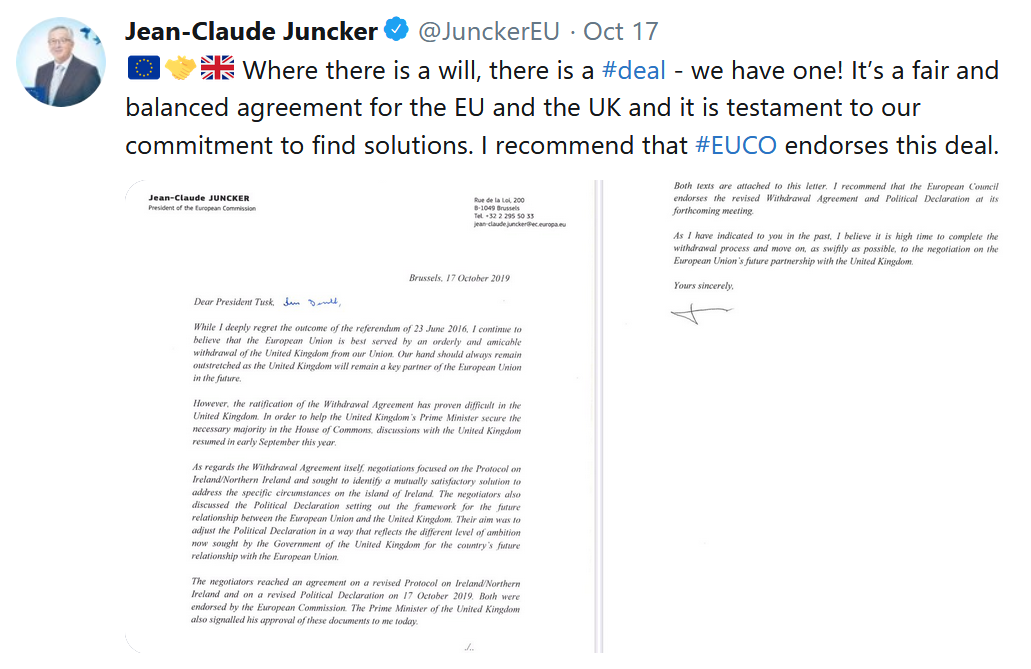
The European Council then considered and agreed the revised Withdrawal Agreement and Political Declaration and invited the European Parliament, Commission and the Council to take the necessary steps to ensure that the agreement could enter into force on 1 November 2019.
OPERATON OF THE PROTOCOL ON IRELAND/NORTHERN IRELAND
On the 18 October, the government published a note addressing “terminability” of the Northern Ireland Protocol. It stated that:
The Government's legal position on the question of terminability of the Protocol on Ireland/Northern Ireland is set out below. This has been endorsed by the Attorney General.
Article 18 of the Protocol provides for a process by which democratic consent in Northern Ireland must be obtained to the continued application of Articles 5 to 10 of the Protocol after an initial period ending four years after the end of the transition period. The mechanism for obtaining democratic consent is set out in the unilateral declaration referred to in paragraph 2 of Article 18.
Article 18 plainly makes the continuation of the application of Articles 5 to 10 of the Protocol conditional upon the obtaining of consent by the mechanism described in the Unilateral Declaration.
There are no grounds for supposing that the EU would have any legal basis to assert that Articles 5 to 10 of the Protocol should continue to apply absent that consent or that the EU would possess a veto over the right of members of the Northern Ireland Legislative Assembly to withhold consent to the continued application of those provisions.
The UK Government also published a declaration concerning the operation of the ‘Democratic consent in Northern Ireland’ provision of the Protocol on Ireland/Northern Ireland.
Declaration by Her Majesty’s Government of the United Kingdom of Great Britain and Northern Ireland concerning the operation of the ‘Democratic consent in Northern Ireland’ provision of the Protocol on Ireland/Northern Ireland
The United Kingdom recalls its obligation under Article 18 of the Protocol on Ireland/Northern Ireland to provide the opportunity for democratic consent in Northern Ireland to the continued application of certain provisions in that Protocol in a manner consistent with the 1998 Agreement. It notes that under that Article, the modalities for determining democratic consent must be in accordance with this declaration.
The notification to the European Union of the outcome of the democratic consent processes under Article 18 of the Protocol is a matter for the Government of the United Kingdom under paragraph 3 of Schedule 2 to the Northern Ireland Act 1998.
The United Kingdom affirms that the objective of the democratic consent process set out below should be to seek to achieve agreement that is as broad as possible in Northern Ireland and, where possible, through a process taken forward and supported by a power sharing Northern Ireland Executive which has conducted a thorough process of public consultation. This should include cross-community consultation, upholding the delicate balance of the 1998 Agreement, with the aim of achieving broad consensus across all communities to the extent possible.
The United Kingdom Government will provide support as appropriate to the Northern Ireland Executive in consulting with businesses, civil society groups, representative organisations (including of the agricultural community) and trade unions on the democratic consent decision. Where the democratic consent process is operating under the alternative process provided for in paragraph 5, the United Kingdom Government will provide support as appropriate to Members of the Legislative Assembly in consulting with businesses, civil society groups, representative organisations (including of the agricultural community) and trade unions on the democratic consent decision. The North South Ministerial Council and British-Irish Intergovernmental Conference should be involved in any consultation process.
The United Kingdom affirms that the process for affording or withholding consent does not have any bearing on or implications for the constitutional status of Northern Ireland, which is set out in the 1998 Agreement and remains wholly unaffected by the Withdrawal Agreement. The United Kingdom remains able to make further provision for the role of the Northern Ireland Executive and Assembly within its own constitutional arrangements, and providing these are without prejudice to this declaration, the Withdrawal Agreement and the 1998 Agreement.
Commitment to legislate for a democratic consent process
1. The United Kingdom undertakes to reflect as necessary in the legislation of the United Kingdom the commitments in respect of the democratic consent mechanism set out in this Declaration in advance of the date on whic h notice is first provided under paragraph 2, including in respect of the independent review set out in paragraph 7.
Transmission of the notice
2. The United Kingdom Government will give two months’ written notice to the First Minister and deputy First Minister, the Presiding Officer, and / or the Clerk to the Northern Ireland Assembly of each date on which the United Kingdom will provide notification to the European Union as to whether there is democratic consent in Northern Ireland to the continu ed application of Articles 5 to 10 of the Protocol.
Democratic Consent Process
3. The United Kingdom undertakes to provide for a Northern Ireland democratic consent process that consists of:
a. A vote to be held in the Northern Ireland Assembly on a motion, in line with Article 18 of the Protocol, that Articles 5 to 10 of the Protocol shall continue to apply in Northern Ireland.
b. Consent to be provided by the Northern Ireland Assembly if the majority of the Members of the Assembly, present and voting, vote in favour of the motion.
c. The Northern Ireland Assembly notifying the United Kingdom Government of the outcome of the consent process no less than 5 days before the date on which the United Kingdom is due to provide notification of the consent process to the European Union.
4. The United Kingdom will make provision such that if the motion for the purpose of paragraph 3(a) has not been proposed by the First Minister and deputy First Minister, acting jointly, within one month of the written notice in paragraph 2 being given, the motion can instead be tabled by any Member of the Legislative Assembly. Where the motion for the purpose of paragraph 3(a) has been proposed by the First Minister and deputy First Minister the Northern Ireland Executive should consider the matter in line with normal practice and procedure, including providing the Assembly with explanatory materials as appropriate.
Alternative process
5. The United Kingdom will provide for an alternative democratic consent process in the event that it is not possible to undertake the democratic consent process in the manner provided for in paragraphs 3 and 4.
6. The alternative process referred to in paragraph 5 will make provision for democratic consent to be provided by Members of the Legislative Assembly if the majority of the Members of the Legislative Assembly, present and voting, vote in favour of the continued application of Articles 5 to 10 of the Protocol on Northern Ireland and Ireland in a vote specifically arranged for this purpose. This alternative process will also provide for the United Kingdom Government to be notified of the outcome of the consent process.
Independent review
7. In the event that any vote in favour of the continued application of Articles 5 to 10 of the Protocol, held as part of the democratic consent process or alternative democratic consent process, is passed by a simple majority in line with paragraph 3b rather than with cross community support, the United Kingdom Government will commission an independent review into the functioning of the Northern Ireland Protocol and the implications of any decision to continue or terminate alignment on social, economic and political life in Northern Ireland.
8. The independent review will make recommendations to the Government of the United Kingdom, including with regard to any new arrangements it believes could command cross - community support.
9. The independent review will include close consultation with the Northern Ireland political parties, businesses, civil society groups, representative organisations (including of the agricultural sector) and trade unions. It will conclude within two years of the vote referred to in paragraph 7 above.
FIRST SATURDAY SITTING OF PARLIAMENT SINCE 1939
On 19 October, the Withdrawal Agreement and Political Declarations were laid in Parliament ahead of the first Saturday sitting since 3 September 1939. The following written statement was also laid in Parliament.
Statement that political agreement has been reached and that the United Kingdom has concluded an agreement with the European Union under Article 50(2) of the Treaty on European Union.
This is a statement, for the purposes of section 1 of the European Union (Withdrawal) Act (No. 2) 2019, that the United Kingdom has concluded an agreement with the European Union under Article 50(2) of the Treaty on European Union, and for the purposes of section 13(1)(a) of the European Union (Withdrawal) Act 2018, that political agreement has been
reached.
With regard to section 13(1)(a) of the European Union (Withdrawal) Act 2018, I am of the opinion that an agreement in principle has been reached in negotiations under Article 50(2) of the Treaty on European Union on the substance of:
a. the arrangements for the United Kingdom’s withdrawal from the European Union, and
b. the framework for the future relationship between the European Union and the United Kingdom after withdrawal.
A copy of the negotiated withdrawal agreement which, in my opinion, reflects the agreement in principle so far as relating to the arrangements for withdrawal, including provisions for the implementation period, has been laid before each House of Parliament on Saturday 19 October with the title “Agreement on the withdrawal of the United Kingdom of Great Britain
and Northern Ireland from the European Union and the European Atomic Energy Community”.
An additional document relating to the withdrawal agreement, which is a unilateral declaration by the United Kingdom, is also being laid alongside this statement with the title “Declaration by Her Majesty’s Government of the United Kingdom of Great Britain and Northern Ireland concerning the operation of the ‘Democratic consent in Northern Ireland’
provision of the Protocol on Ireland/Northern Ireland”.1
A copy of the framework for the future relationship which, in my opinion, reflects the agreement in principle so far as relating to the framework for the future relationship between the EU and the United Kingdom has been laid before each House of Parliament on Saturday 19 October with the title “Political Declaration setting out the framework for the future relationship between the European Union and the United Kingdom”.
These documents have been laid before each House of Parliament ahead of the parliamentary debates required under section 1 of the European Union (Withdrawal) Act (No.2) 2019 and section 13 of the European Union (Withdrawal) Act 2018.
At this stage, the withdrawal agreement represents a version of the text which has been agreed, but has not yet been formally signed. Before this formal signature takes place, the agreement must complete the European Union’s jurist-linguist translation process. During that time, minor technical corrections will be made to the text, though these changes will not affect the substance of the agreement. The laying of the withdrawal agreement before Parliament at this stage does not therefore trigger any procedures under the Constitutional Reform and Governance Act 2010.
In relation to the section 20 procedure for ratification under the Constitutional Reform and Governance Act 2010, the Government will make provision in the Withdrawal Agreement Bill to ensure that the Withdrawal Agreement can be ratified before exit day.
Rt Hon Boris Johnson MP
Prime Minister
1 The declaration was submitted by the United Kingdom Government to the European Union on 17 October with the title “Declaration of 17 October 2019 by Her Majesty’s Government of the United Kingdom of Great Britain and Northern Ireland concerning the operation of the ‘Democratic consent in Northern Ireland’ provision of the Protocol on Ireland/Northern Ireland”.
The government motion seeking House of Commons approval for the Withdrawal Agreement and Political Declaration was subject to an amendment, in the name of Sir Oliver Letwin, and the House resolved (For 322 and Against 306):
“That, in light of the new deal agreed with the European Union, which enables the United Kingdom to respect the result of the referendum on its membership of the European Union and to leave the European Union on 31 October with a deal, this House has considered the matter but withholds approval unless and until implementing legislation is passed.”
THREE LETTERS FROM THE PRIME MINISTER
In the evening of 19 October 2019, the Prime Minister sent the following unsigned letter to the President of the European Council, Donald Tusk.
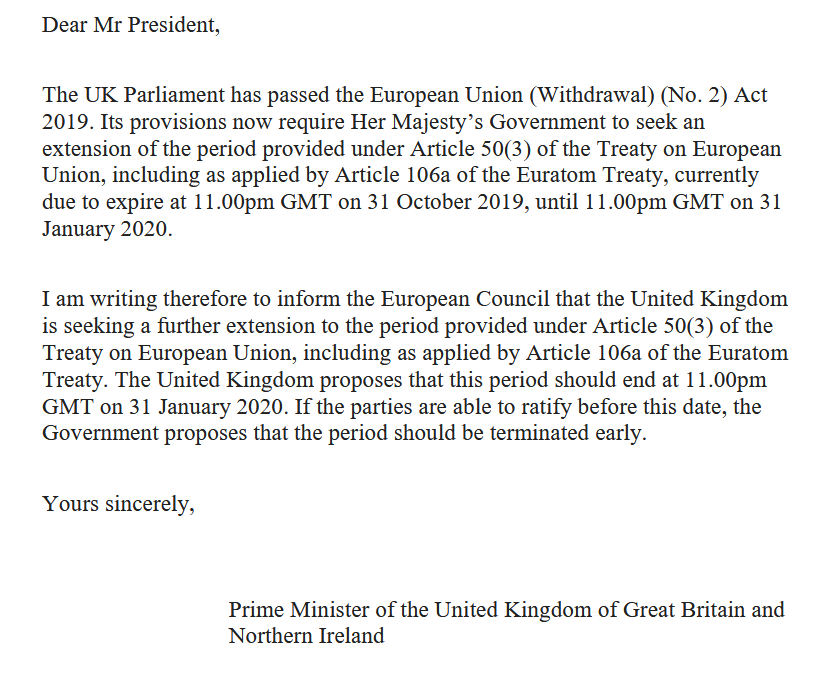
The Prime Minister’s letter was accompanied by a cover letter from Sir Tim Barrow, the United Kingdom Permanent Representative to the European Union, which stated that in terms of the next steps for parliamentary process, the Government would introduce the necessary legislation next week in order to proceed with ratification of the Withdrawal Agreement.
WITHDRAWAL AGREEMENT BILL
 On 21 October 2019, the European Union (Withdrawal Agreement) Bill 2019-20, which provides for the ratification and implementation of the Withdrawal Agreement treaty, was introduced to the House of Commons and given its First Reading.
On 21 October 2019, the European Union (Withdrawal Agreement) Bill 2019-20, which provides for the ratification and implementation of the Withdrawal Agreement treaty, was introduced to the House of Commons and given its First Reading.
An analysis of the provisions in the Bill which address the Protocol on Ireland/Northern Ireland has been published by the House of Commons Library.
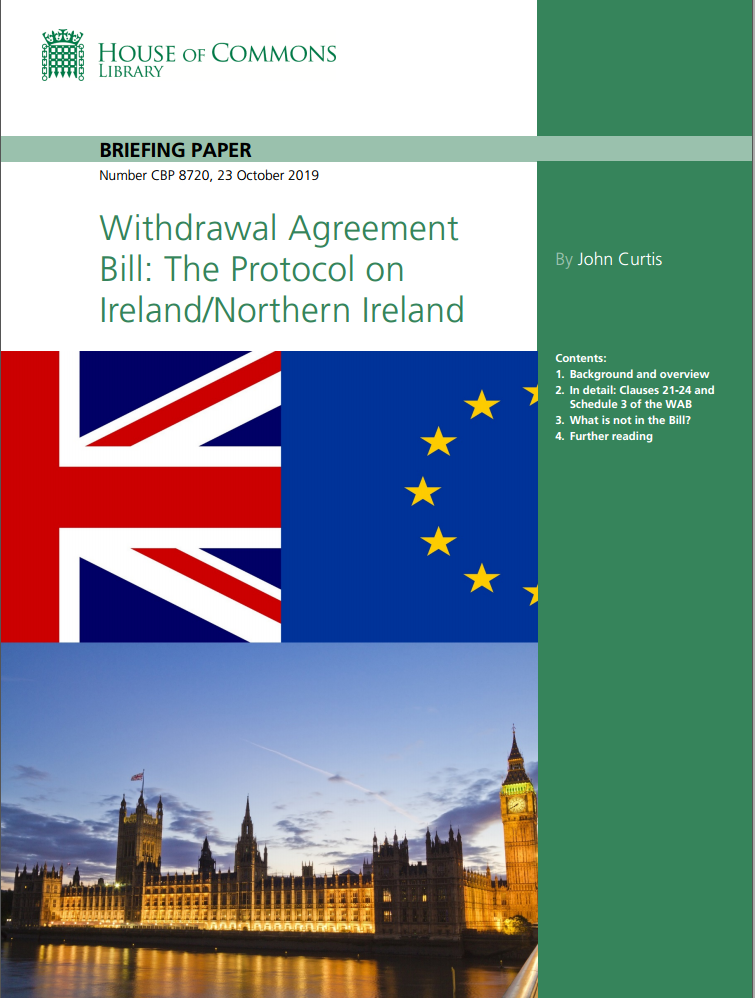 Clauses 21 to 24 of the Withdrawal Agreement Bill, along with Schedule 3, are the parts of the WAB that deal with the Protocol on Ireland/Northern Ireland (the Protocol) Clause 21 of the WAB, amends the European Union (Withdrawal) Act 2018, and creates a significant set of powers that will enable the Protocol. These clauses will empower Ministers to make regulations with the power of primary legislation, including the power to amend the Act itself. This is often referred to as an ‘Henry VIII Clause’…The use of these regulations will be restricted by Section 10 of the European Union (Withdrawal) Act 2018.
Clauses 21 to 24 of the Withdrawal Agreement Bill, along with Schedule 3, are the parts of the WAB that deal with the Protocol on Ireland/Northern Ireland (the Protocol) Clause 21 of the WAB, amends the European Union (Withdrawal) Act 2018, and creates a significant set of powers that will enable the Protocol. These clauses will empower Ministers to make regulations with the power of primary legislation, including the power to amend the Act itself. This is often referred to as an ‘Henry VIII Clause’…The use of these regulations will be restricted by Section 10 of the European Union (Withdrawal) Act 2018.
Clause 22 gives devolved authorities or devolved authorities acting jointly with a Minister (where relevant), a similar power as the UK Government to make laws by regulation (Henry VIII powers), in order to enact the Protocol. These must be used for the same purposes as set out Clause 21(1).
Clause 23 & Schedule 3 give effect to Article 2(1) of the Protocol which provides that there shall be “no diminution of rights, safeguards or equality of opportunity” as set out in the relevant section of the Belfast/Good Friday Agreement, as a result of Brexit. It ensures that six EU directives relating to equality and discrimination that are listed in the Protocol will continue to apply in Northern Ireland in perpetuity. Schedule 3 does this by restricting the legislative competence of the Northern Ireland Assembly, and giving the Human Rights bodies in Northern Ireland increased powers to monitor and protect the application of those equality directives.
Clause 24 prevents the Government from agreeing to any recommendation in the Joint Committee that would alter arrangements for North-South cooperation as provided for in the Belfast/Good Friday agreement, or establish a new North-South implementation body or change an existing body.
The Bill was passed at Second Reading on 22 October 2019 but the subsequent Programme Motion, in which the government set out its proposed timetable for the Bill's progress through the House of Commons, was not passed.
LEGISLATIVE CONSENT MEMORANDUMS IN SCOTTISH PARLIAMENT AND NATIONAL ASSEMBLY FOR WALES
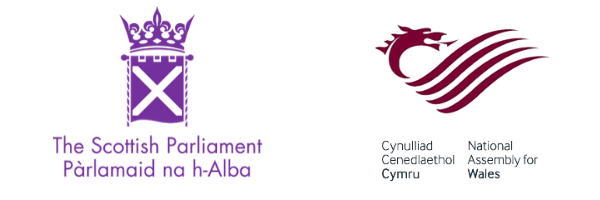
On 22 October, the Constitutional Relations Secretary, Michael Russell, lodged a Legislative Consent Memorandum (LCM) with the Scottish Parliament. In it he raised concerns over the content of the Withdrawal AgreementBill, its implementation and the lack of opportunity for detailed parliamentary scrutiny in either the UK or Scottish Parliaments. The LCM states that:
“The Scottish Government believes that the best option for the UK as a whole, and for Scotland, is to remain in the EU, as voted for by the people of Scotland. The Scottish Government supports a further referendum with the option to remain in the EU included on the ballot paper. The Scottish Government cannot support a Bill that would withdraw Scotland, as part of the UK, from the EU. It cannot recommend that the Scottish Parliament consent to a Bill to give effect to a withdrawal agreement which it considers will do significant damage to Scotland. And the Scottish Government cannot support a Bill of such significance being rushed through without the opportunity for proper parliamentary scrutiny in either the UK or Scottish Parliaments. Given the extremely limited opportunity available for both essential scrutiny, based on evidence and impact assessment, and for the public to understand the implications of the Withdrawal Agreement, the Scottish Government believes that this legislation should not be progressed. The responsible step now would be to legislate for a further referendum to allow the electorate to decide. The Scottish Government recommends that the Scottish Parliament should not consent to any part of the Bill, and should indicate its opposition to the UK’s withdrawal from the EU and to the Withdrawal Agreement. The Scottish Government does not therefore intend to lodge a legislative consent motion in relation to the Bill.”
On 23 October, the First Minister of the Welsh Government, Mark Drakeford, laid a Legislative Consent Memorandum for the Withdrawal Agreement Bill in the National Assembly for Wales. The conclusion of the LCM states that:
It is the view of the Welsh Government that it is appropriate to deal with these provisions in this UK Bill as this will offer the greatest degree of consistency and certainty for citizens and businesses across the UK. However, the Welsh Government cannot recommend that the National Assembly give their consent to this Bill as it is currently presented.
MEPs DISCUSS THE DEAL
On 22/23 October, MEPs discussed the Withdrawal Agreement in a plenary meeting of the Parliament.
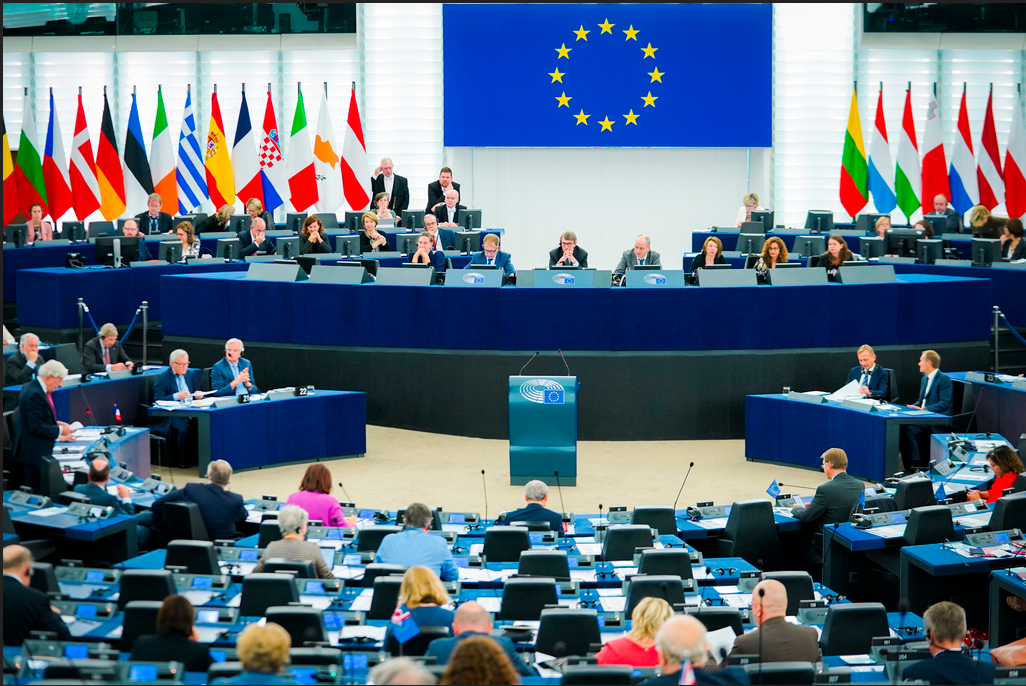
Donald Tusk, in his introductory speech (his last as European Council President) to the Parliament stated:
“When it comes to Brexit, the European Council endorsed the deal reached by our negotiator and Prime Minister Johnson’s Government. As you know, it is based on the deal that we agreed with the previous Government. The changes concern the Protocol on Ireland and Northern Ireland, formerly known as the backstop. Prime Minister Johnson’s acceptance to have customs checks at the points of entry into Northern Ireland will allow us to avoid border checks between Ireland and Northern Ireland, and will ensure the integrity of the single market. The revised deal was possible and acceptable to the EU because: firstly, it had the support of Ireland; secondly, it had the support of the Commission, ensuring that all our negotiating objectives were met; and, thirdly, because it avoids a chaotic no-deal Brexit. On the Council side, we have just finalised the necessary steps for the EU’s approval, and the legal texts are now with you. The European Parliament has a role to play, and it is an important one. The situation is quite complex following events over the weekend in the UK and the British request for an extension of the Article 50 process. I am consulting the leaders on how to react, and will decide in the coming days. It is obvious that the result of these consultations will very much depend on what the British Parliament decides, or doesn’t decide. We should be ready for every scenario. But one thing must be clear: as I said to Prime Minister Johnson on Saturday, a no-deal Brexit will never be our decision.”
During the plenary session the outgoing President of the European Commission, Jean Claude Juncker, said:
“The Commission has worked tirelessly to negotiate and renegotiate an agreement with the United Kingdom, to respect the UK's decision to leave the European Union. We now have a new agreement, which – again – creates the legal certainty for an orderly withdrawal of the UK from the European Union. It took a huge amount of work to arrive at this point. I listened to Prime Minister Johnson in the same way as I listened to Prime Minister May. Our negotiators – mainly Michel Barnier – have once again worked around the clock. And once again, they have shown creativity and determination. The agreement we reached with the United Kingdom's government addresses this Parliament's demands – all Parliaments' demands. I will always regret the United Kingdom's decision to leave the Union. But at least we can look ourselves in the eye and say that we have done all in our power to make sure that this departure is orderly. In this same spirit, we have done everything in our power to prepare the European Union for all eventualities, irrespective of what is happening on the other side of the Channel. We need now to watch events in Westminster very closely. But it is not possible, not imaginable that this Parliament would ratify the agreement before Westminster will have ratified the agreement – first London, then Brussels and Strasbourg.”
TASK FORCE FOR RELATIONS WITH THE UNITED KINGDOM
On 22 October, the European Commissin decided to set up a ‘Task Force for Relations with the United Kingdom’ (UKTF) as part of the Commission’s Secretariat-General. Michel Barnier was appointed as Head of the Task Force. Addressing the decision to set up the Task Force it was explained that:
“The UKTF will include the current TF50 (’Task Force for the Preparation and the Conduct of the Negotiations with the United Kingdom under Article 50 TEU’) and the Secretariat-General’s ‘Brexit Preparedness’ unit. The Task Force, just like TF50, will coordinate all the Commission’s work on all strategic, operational, legal and financial issues related to Brexit. It will be in charge of the finalisation of the Article 50 negotiations, as well as the Commission’s ‘no-deal’ preparedness work and the future relationship negotiations with the UK. It will operate under the direct authority of the President and in close cooperation with the Secretariat-General and all Commission services concerned. Once the Withdrawal Agreement is ratified by the UK Parliament, and the European Parliament has given its consent, the EU is ready to immediately kick off work leading to negotiations on our future relationship with the UK, in full respect of European Council guidelines. Michel Barnier will be supported by a Deputy Head of the Task Force, at Deputy Director-General level. Today’s decision takes effect on 16 November 2019 – regardless of developments in the UK – and has been agreed in close coordination between President Juncker and President-elect Ursula von der Leyen. “
FLEXTENSION

On the 28 October, the European Council adopted a decision to extend the period under Article 50 for a further three months until 31 January, although the UK will be able to leave as soon as the ratification of the withdrawal agreement is completed. The declaration which accompanied the decision granting a further extension underlined that as long as the UK remained a member state, it would be subject to the same rights and obligations as other countries. Therefore, if the UK is still part of the EU by 1 December, when the new Commission is set to take over, a UK Commissioner will need to be nominated.
On 28 October, Boris Johnston, wrote to Donald Tusk to confirm the UK’s agreement to the extension.
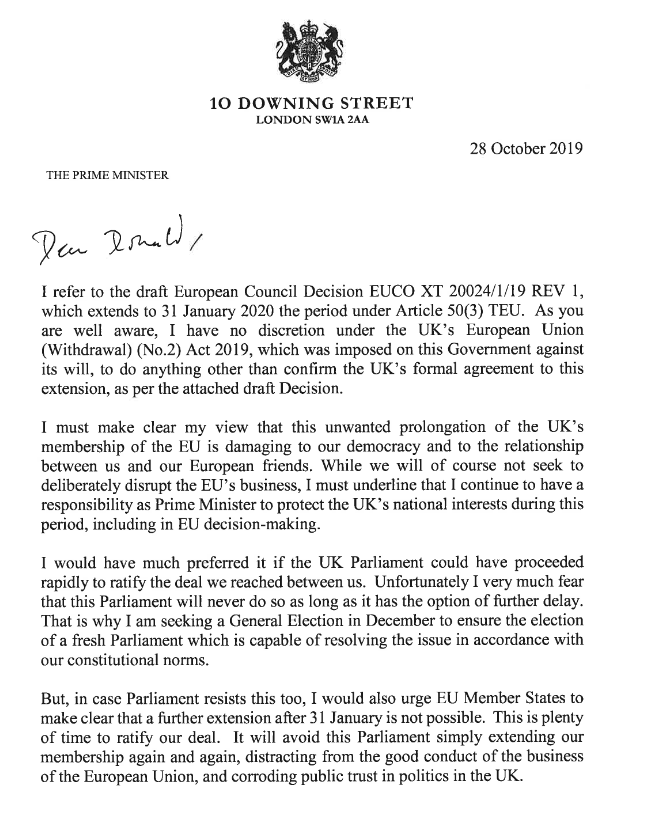
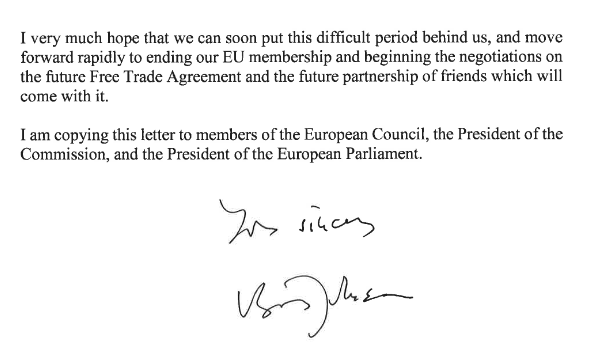
OPERATION YELLOWHAMMER STOOD DOWN
On 29 October, the Civil Service World reported that Operation Yellowhammer, the government’s planning for a possible no-deal exit, had been stood down after the extension of the Article 50 period. The Civil Service World also reported that the “Get Ready for Brexit” communications campaign was also being paused after the extension. According to the Civil Service World, the campaign confirmed that the operation had been stood done and that broader no-deal planning would continue.
EARLY PARLIAMENTARY GENERAL ELECTION BILL 2019-20
On 29 October, the Early Parliamentary General Election Bill 2019-20 was introduced in the House of Commons. The Bill provides that the 12 December 2019 be treated as polling day appointed under section 2(7) of the Fixed-term Parliaments Act 2011. This means that the provisions in section 3 of the 2011 Act in respect of the dissolution of Parliament will apply to the early parliamentary general election.
In the Explanatory Notes to the Bill as brought from the House of Commons to the House of Lords on 29 October 2019 it was stated, amongst other things, that:
The Government considers it desirable to hold a general election on the date set out in the Bill. The Government wishes to set out the date that the election will take place in legislation, in order to provide maximum transparency in relation thereto.
It is a statutory requirement that Parliament must dissolve 25 working days before polling day. An election on 9 December 2019 would mean the House dissolving at one minute past midnight on Friday 1 November. This would require the Early Parliamentary General Election Bill currently before the House to complete passage through the House of Commons and House of Lords and achieve Royal Assent on Thursday 31 October.
All Parliamentary business planned that relies on the House sitting next week could not proceed, for example the election of a new Speaker on 4 November. The Government would also need to pass the Northern Ireland Budget Bill before dissolution to ensure the NI Civil Service can access the funding it needs to deliver public service s and proper governance in the continued absence of a functioning Executive.
The 9 December would make the polling day a Monday and this places additional burdens on administrative preparations for polling stations and getting casual staff to work over the weekend. This could increase the cost of the election. In the modern era for elections there has never been a Monday election. It is also the case that a 9 December election could lead to two different voter registration deadlines across Scotland which could be confusing for Scottish electors.
The Prime Mininster, Boris Johnston, at the second reading stage of the Bill, stated that:
“It is now a week since Parliament voted to delay Brexit yet again. It is a week since this Parliament voted yet again to force Brussels to keep this country in the European Union for at least another three months, at a cost of £1 billion a month. In the days since then, the Government have tried to be reasonable and to ascribe the best possible motives to our friends and colleagues around the House. I have twice offered more time for debate. I offered more time last week and I made the same offer last night. I said that we were prepared to debate this Bill. I said we were prepared to debate the withdrawal Bill around the clock to allow Parliament time to scrutinise it, to the point of intellectual exhaustion. We must bear in mind that not only has this House been considering this issue for three and a half years, but last week when this Bill was being debated there was not a single new idea and not a single new suggestion. All they wanted was more time, more weeks, more months, when they could not even provide the speakers to fill the time allotted.”
HOUSE OF LORDS EU COMMITTEE EVIDENCE SESSION ON THE REVISED PROTOCOL ON IRELAND/NORTHERN IRELAND.
On the 29 October, the House of Lords EU Committee took evidence from Dr Katy Hayward, Reader in Sociology, Queen’s University Belfast; Aodhán Connolly, Director, Northern Ireland Retail Consortium; and Ivor Ferguson, President, Ulster Farmers’ Union on the revised protocol on Ireland / Northern Ireland. The topics for discussion included:
- The political and economic impact of the revised Protocol on Ireland / Northern Ireland;
- The proposed ‘simple majority’ consent mechanism;
- The practical implications of the provision for Northern Ireland’s continued regulatory; alignment with the Single Market for goods; and
- The impact of the new customs and VAT provisions under the revised Protocol.
SPEECH BY MICHEL BARNIER AT THE EUROPEAN ECONOMIC AND SOCIAL COMMITTEE
On 30 October, Michel Barnier made a speech at the European Economic and Social Committee. In it noted that:
Boris Johnson’s government accepted the Withdrawal Agreement but wanted to open one point: the Protocol on Ireland and Northern Ireland.
Faced with this request, the responsible choice of the EU27 was to look for a new compromise:
- To engage with the new British government.
- And to look for solutions that work for both sides, respecting clearly the guidelines set by the European Council and the resolutions of the European Parliament.
We had to agree in the Withdrawal Agreement on a legally operative solution to reconcile four objectives:
1. Avoid a hard border between Ireland and Northern Ireland;
2. Preserve the all - island economy;
3. Protect the integrity of the Single Market. That means protecting consumers and businesses;
4. Ensure that Northern Ireland remain s in the UK’s customs territory – which was extremely important to Prime Minister Johnson and the UK government.
Discussions were at times difficult. Days and nights.
But we have delivered. Together: EU and UK.
The solution that we found rests on three main elements.
First, Northern Ireland will remain aligned over time to a limited set of EU rules, notably all rules related to goods.
This means that checks on goods, when done at the border, will take place at the points of entry into Northern Ireland and not across the island.
For this purpose, UK authorities will be in charge of applying the Union’s Customs Code in Northern Ireland as well as making sure all goods comply with EU standards. The EU27 authorities will work together with the UK authorities. The Court of Justice of the European Union will control the application of the rules.
Secondly, beyond applicable procedures, there is also the question of customs duties.
Northern Ireland will remain in the UK’s customs territory. It will therefore benefit from the UK’s future trade policy.
But Northern Ireland will also remain an entry point into our Single Market. So what have we done to square this circle?
UK tariffs will apply on products entering Norther n Ireland, so long as these goods are not at risk of entering our Single Market.
However, for goods at risk of entering the Single Market, EU tariffs will apply.
Thirdly, remember that the UK and Ireland are co - guarantors of the Good Friday (Belfast) agreement. In this spirit, Prime Minister Johnson and Taoiseach Leo Varadkar wanted to ensure long-term democratic support for the application by UK authorities of relevant Union rules in Northern Ireland. We have always supported this intention.
So, four years after the entry into force of the Protocol, the elected representatives of Northern Ireland will be able to decide, by simple majority, whether to continue applying relevant Union rules in Northern Ireland or not. This democratic support is, in my view, a cornerstone of our newly agreed approach.
Why?
Because the new Protocol is no longer a temporary solution, ‘unless and until ’, that would have been replaced later on. The solution we have agreed is a sustainable one. And in order to be sustainable, it needed to be immediately operational and to have democratic support in Northern Ireland. So it makes sense to ensure consent by Northern Ireland over time.
SCOTTISH GOVERNMENT ASSESSMENT OF WITHDRAWAL AGREEMENT AND POLITICAL DECLARATION
On 30 October, the Scottish Government published its assessment of the UK Government's proposed future relationship with the European Union, as outlined in the revised Withdrawal Agreement and Political Declaration. Addressing the implications for Scotland’s relative competitive position the report stated that:
Northern Ireland businesses will have easier access to the European Single Market and the UK Government has guaranteed that Northern Ireland businesses and farmers will continue to have “unfettered access” to the rest of the UK market: The Scottish Government fully and unconditionally supports the Good Friday Agreement and the maintenance of an invisible border on the island of Ireland. However, in principle, as with the previous backstop, this proposal provides Northern Ireland with the opportunity for a competitive advantage over Scotland. It removes the need for product standard and safety checks on goods at the border between Ireland and Northern Ireland because both will be part of an "all - island regulatory zone", while Scottish businesses face greater “friction” at the border with the EU – and at the border with Northern Ireland. The requirements for third countries to comply with regulations of the European Single Market are substantial, and represent a real cost to business.
The Prime Minister told the House of Commons that this was a “good arrangement” for Northern Ireland, “eliminating any need for associated checks at the border”, whilst also ensuring “unfettered access for goods moving from Northern Ireland to the rest of the United Kingdom’s internal market ”. The Chancellor of the Duchy of Lancaster, the Rt Hon Michael Gove MP agreed that Northern Irish businesses will have easier access to the European Single Market than businesses in the rest of the UK. The Secretary of State for Foreign and Commonwealth Affairs, the Rt Hon Dominic Raab MP, described the deal as a “win for Northern Ireland business” and also a “cracking” one for Northern Ireland businesses: “overall, what Northern Ireland businesses get is remaining part of the UK customs territory, no infrastructure at the border with the Republic and frictionless access to the single market. It is a cracking deal for Northern Ireland businesses.”
Overall the broad consensus of economic analysis is, that the less that the UK, and Scottish, economies are ‘aligned’ with the EU the greater the economic damage, and this analysis is confirmed by the Scottish Government’s own economic modelling as set out in its Scotland’s Place in Europe publications.
There is significant uncertainty as to how the economic impact may play out, but some scenarios might include 16 Scottish business losing market share compared with direct competitors with a Northern Ireland base. In addition there is a risk that the corporate structures, investments and wider supply chains that underpin Scotland’s existing international trade may be re-organised to take advantage of Northern Ireland’s preferential access to the single market, and to mitigate the risks associated with UK regulations diverging from the EU.
EXIT DAY CHANGED TO 31 JANUARY 2020
On the 30 October, secondary legislation was used to change exit day to 31 January 2020.
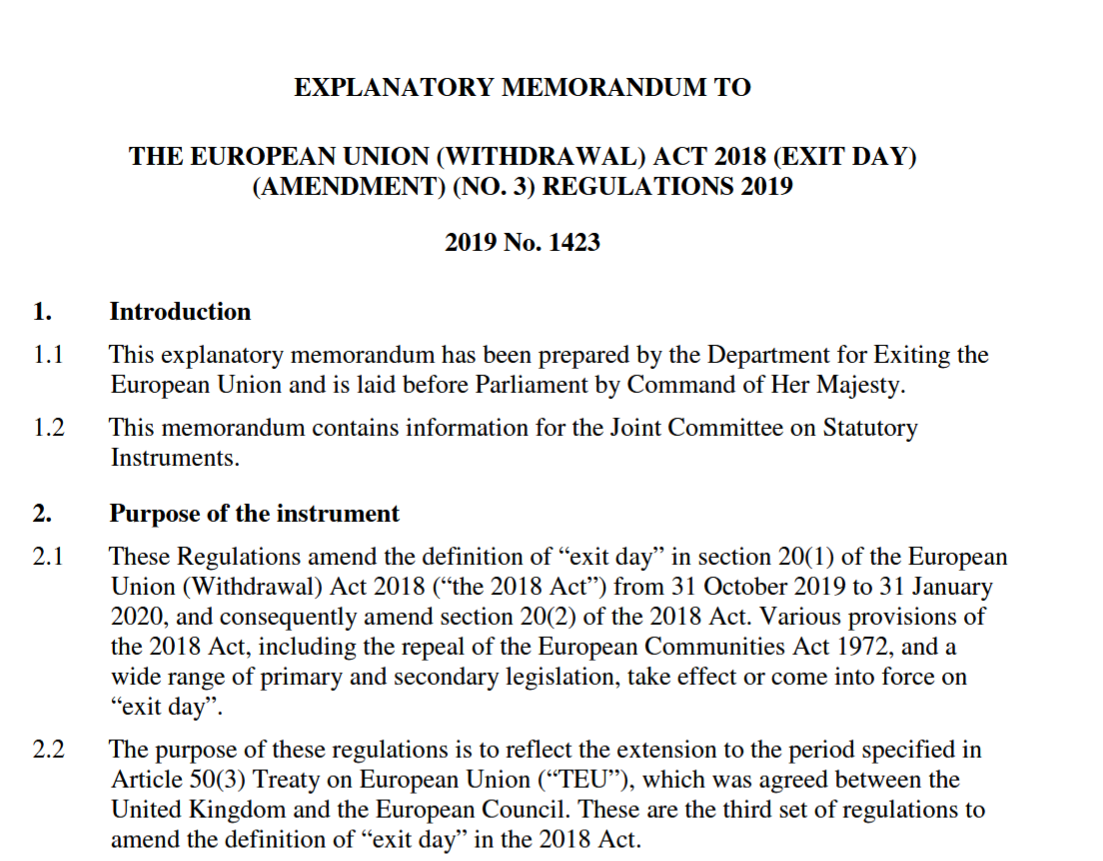
WHAT’S NEXT?

Nov 01: New von der Leyen Commission due to take office
Nov 01: New President of the EU Council (Charles Michel) due to take office
Dec 12: UK General Election
Jan 01: Croatia’s presidency of the Council of the EU begins
Jan 31: Exit Day



